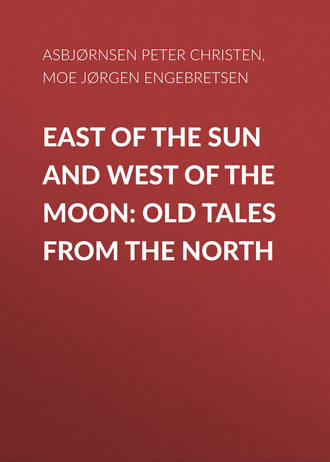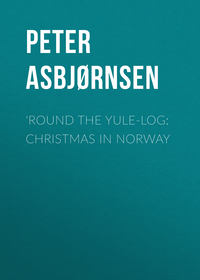 полная версия
полная версияEast of the Sun and West of the Moon: Old Tales from the North
That, thought the King, could be easily managed, and so he sent word to all the best and cleverest goldsmiths in the country that they should make these checkers for the Princesses. For all they tried there was no one who could make them. At last all the goldsmiths had been to the palace except one, and he was an old, infirm man who had not done any work for many years except odd jobs, by which he was just able to keep himself alive. To him the soldier went and asked to be apprenticed. The old man was so glad to get him, for he had not had an apprentice for many a day, that he brought out a flask from his chest and sat down to drink with the soldier. Before long the drink got into his head, and when the soldier saw this he persuaded him to go up to the palace and tell the King that he would undertake to make the checkers for the Princesses.
He was ready to do that on the spot; he had made finer and grander things in his day, he said. When the King heard there was some one outside who could make the checkers he was not long in coming out.
“Is it true what you say, that you can make such checkers as my daughters want?” he asked.
“Yes, it is no lie,” said the goldsmith; that he would answer for.
“That’s well!” said the King. “Here is the gold to make them with; but if you do not succeed you will lose your life, since you have come and offered yourself, and they must be finished in three days.”
The next morning when the goldsmith had slept off the effects of the drink, he was not quite so confident about the job. He wailed and wept and blew up his apprentice, who had got him into such a scrape while he was drunk. The best thing would be to make short work of himself at once, he said, for there could be no hope for his life; when the best and grandest goldsmiths could not make such checkers, was it likely that he could do it?
“Don’t fret on that account,” said the soldier, “but let me have the gold and I’ll get the checkers ready in time; but I must have a room to myself to work in,” he said. This he got, and thanks into the bargain.
The time wore on, and the soldier did nothing but lounge about, and the goldsmith began to grumble, because he would not begin with the work.
“Don’t worry yourself about it,” said the soldier, “there is plenty of time! If you are not satisfied with what I have promised you had better make them yourself.” The same thing went on both that day and the next; and when the smith heard neither hammer nor file from the soldier’s room the whole of the last day, he quite gave himself up for lost; it was now no use to think any longer about saving his life, he thought.
But when the night came on the soldier opened the window and blew his whistle. The eagle then came and asked what he wanted.
“Those gold checkers, which the Princesses had in the blue mountain,” said the soldier; “but you’ll want something to eat first, I suppose? I have two ox carcases lying ready for you in the hay-loft yonder; you had better finish them,” he said. When the eagle had done she did not tarry, and long before the sun rose she was back again with the checkers. The soldier then put them under his bed and lay down to sleep.
Early next morning the goldsmith came and knocked at his door.
“What are you after now again?” asked the soldier. “You rush about enough in the day, goodness knows! If one cannot have peace when one is in bed, whoever would be an apprentice here?” said he.
Neither praying nor begging helped that time; the goldsmith must and would come in, and at last he was let in.
And then, you may be sure, there was soon an end to his wailing.
But still more glad than the goldsmith were the Princesses, when he came up to the palace with the checkers, and gladdest of all was the youngest Princess.
“Have you made them yourself?” she asked.
“No, if I must speak the truth, it is not I,” he said, “but my apprentice, who has made them.”
“I should like to see that apprentice,” said the Princess. In fact all three wanted to see him, and if he valued his life, he would have to come.
He was not afraid, either of women-folk or grand-folk, said the soldier, and if it could be any amusement to them to look at his rags, they should soon have that pleasure.
The youngest Princess recognised him at once; she pushed the soldiers aside and ran up to him, gave him her hand, and said:
“Good day, and many thanks for all you have done for us. It is he who freed us from the trolls in the mountain,” she said to the King. “He is the one I will have!” and then she pulled off his cap and showed them the ring she had tied in his hair.
It soon came out how the captain and lieutenant had behaved, and so they had to pay the penalty of their treachery with their lives, and that was the end of their grandeur. But the soldier got the golden crown and half the kingdom, and married the youngest Princess.
At the wedding they drank and feasted both well and long; for feast they all could, even if they could not find the Princesses, and if they have not yet done feasting and drinking they must be at it still.
THE CAT ON THE DOVREFELL
Once on a time there was a man up in Finnmark who had caught a great white bear, which he was going to take to the King of Denmark. Now, it so fell out, that he came to the Dovrefell just about Christmas Eve, and there he turned into a cottage where a man lived, whose name was Halvor, and asked the man if he could get house-room there for his bear and himself.
“Heaven never help me, if what I say isn’t true!” said the man; “but we can’t give anyone house-room just now, for every Christmas Eve such a pack of Trolls come down upon us, that we are forced to flit, and haven’t so much as a house over our own heads, to say nothing of lending one to anyone else.”
“Oh?” said the man, “if that’s all, you can very well lend me your house; my bear can lie under the stove yonder, and I can sleep in the side-room.”
Well, he begged so hard, that at last he got leave to stay there; so the people of the house flitted out, and before they went, everything was got ready for the Trolls; the tables were laid, and there was rice porridge, and fish boiled in lye, and sausages, and all else that was good, just as for any other grand feast.
So, when everything was ready, down came the Trolls. Some were great, and some were small; some had long tails, and some had no tails at all; some, too, had long, long noses; and they ate and drank, and tasted everything. Just then one of the little Trolls caught sight of the white bear, who lay under the stove; so he took a piece of sausage and stuck it on a fork, and went and poked it up against the bear’s nose, screaming out:
“Pussy, will you have some sausage?”
Then the white bear rose up and growled, and hunted the whole pack of them out of doors, both great and small.
Next year Halvor was out in the wood, on the afternoon of Christmas Eve, cutting wood before the holidays, for he thought the Trolls would come again; and just as he was hard at work, he heard a voice in the wood calling out:
“Halvor! Halvor!”
“Well,” said Halvor, “here I am.”
“Have you got your big cat with you still?”
“Yes, that I have,” said Halvor; “she’s lying at home under the stove, and what’s more, she has now got seven kittens, far bigger and fiercer than she is herself.”
“Oh, then, we’ll never come to see you again,” bawled out the Troll away in the wood, and he kept his word; for since that time the Trolls have never eaten their Christmas brose with Halvor on the Dovrefell.
ONE’S OWN CHILDREN ARE ALWAYS PRETTIEST
A sportsman went out once into a wood to shoot, and he met a Snipe.
“Dear friend,” said the Snipe, “don’t shoot my children!”
“How shall I know your children?” asked the Sportsman. “What are they like?”
“Oh!” said the Snipe, “mine are the prettiest children in all the wood.”
“Very well,” said the Sportsman, “I’ll not shoot them; don’t be afraid.”
But for all that, when he came back, there he had a whole string of young snipes in his hand which he had shot.
“Oh, oh!” said the Snipe, “why did you shoot my children after all?”
“What! these your children!” said the Sportsman; “why, I shot the ugliest I could find, that I did!”
“Woe is me!” said the Snipe; “don’t you know that each one thinks his own children the prettiest in the world?”




